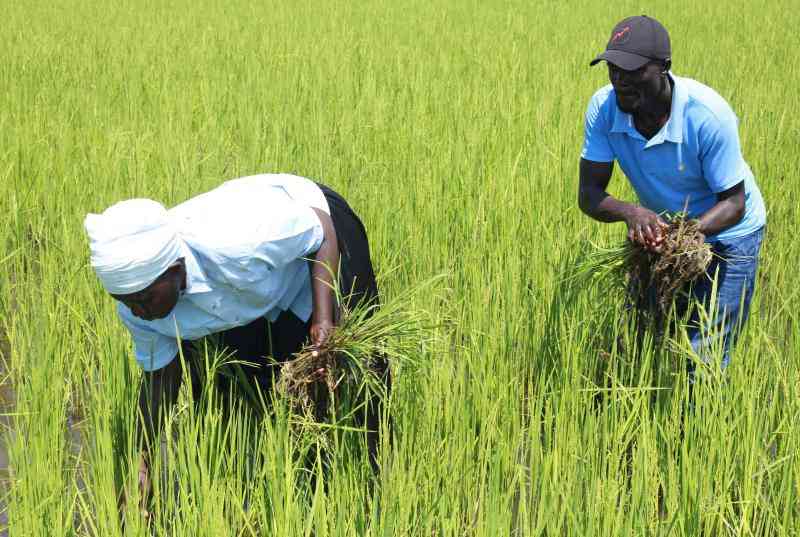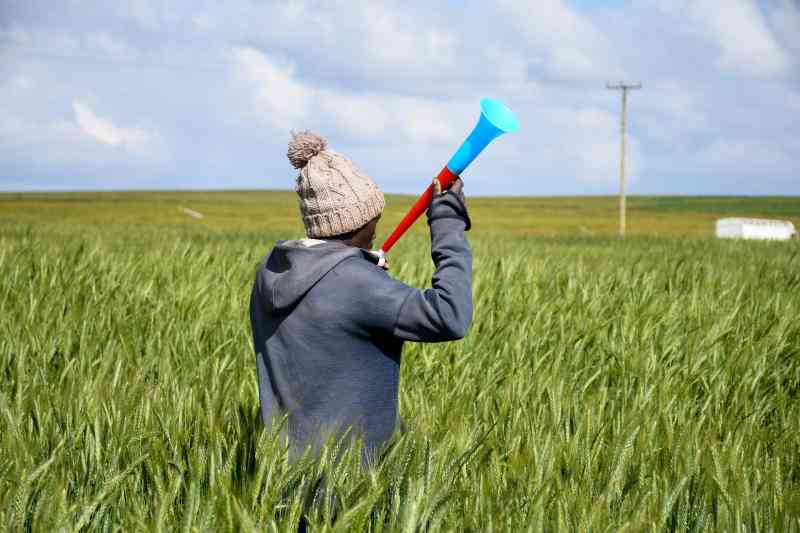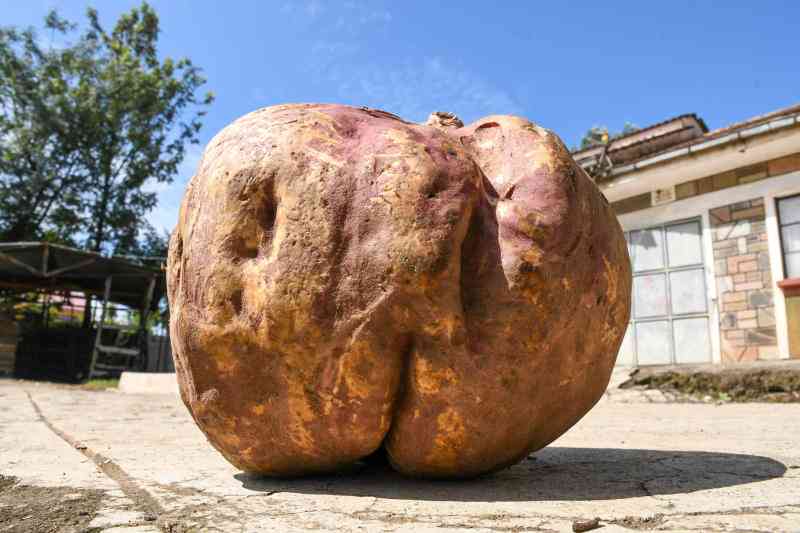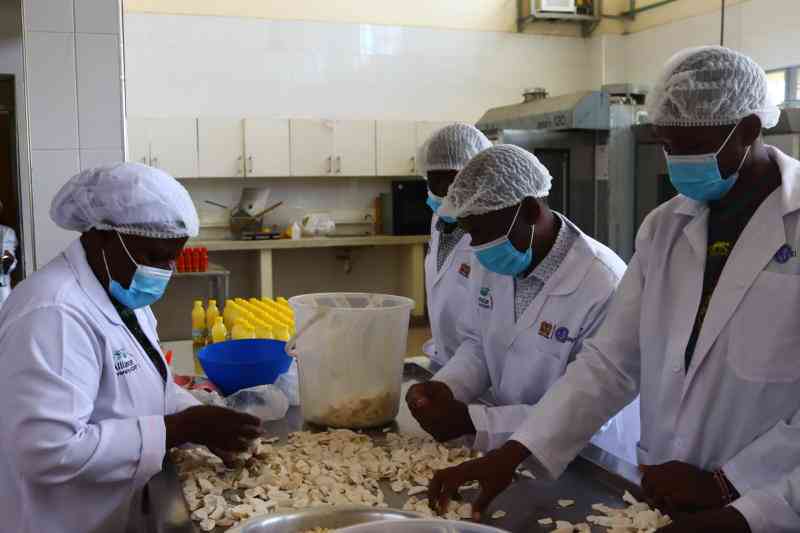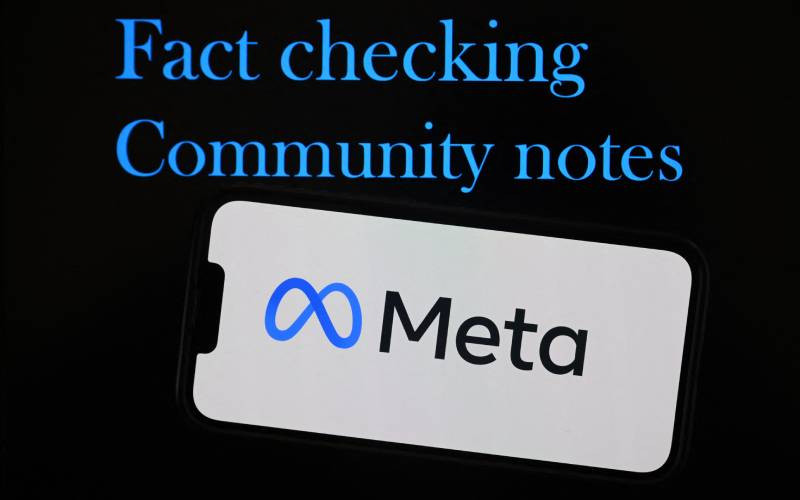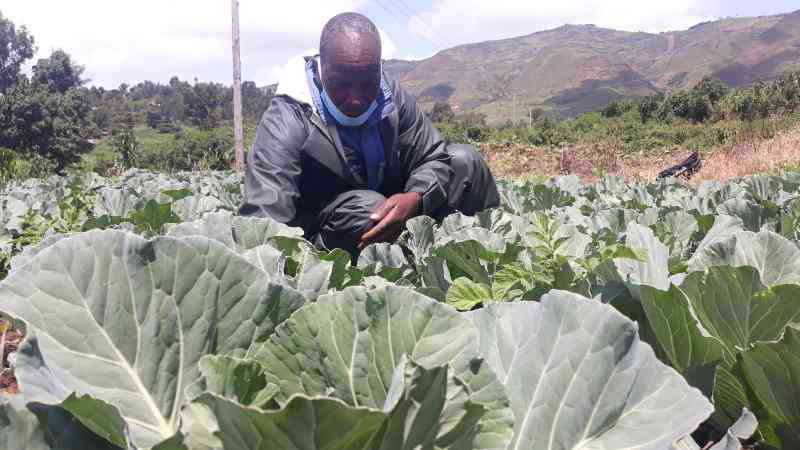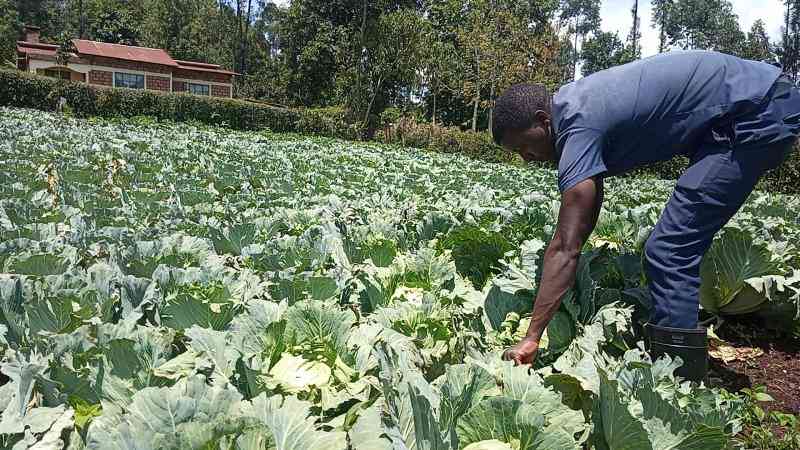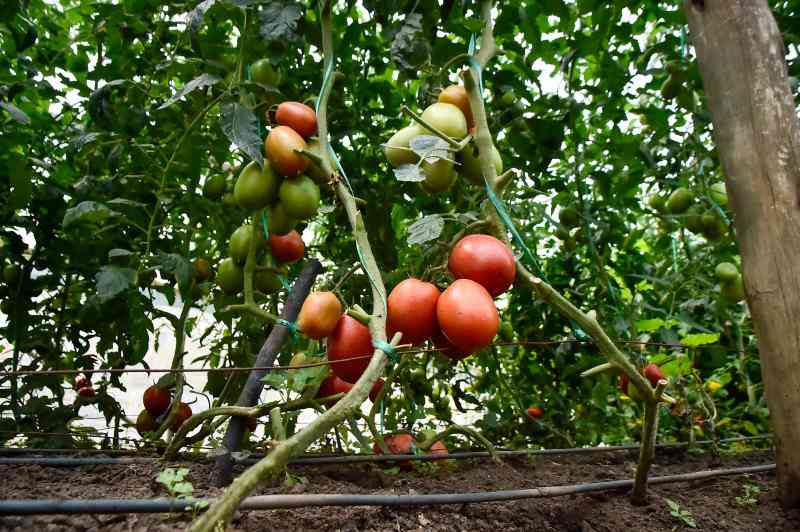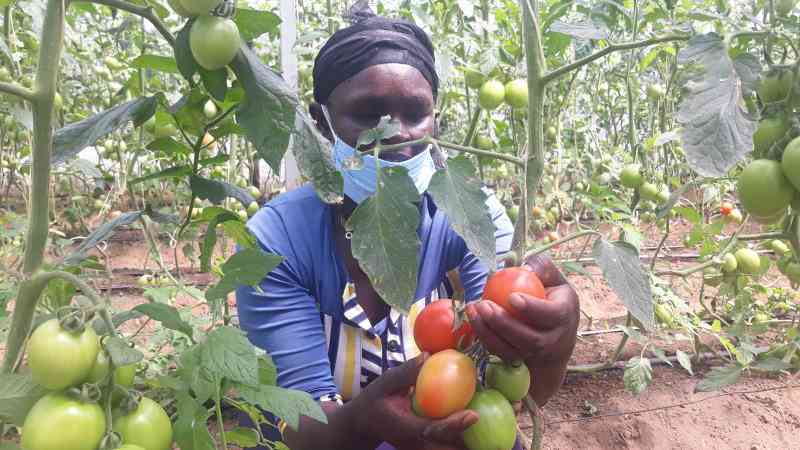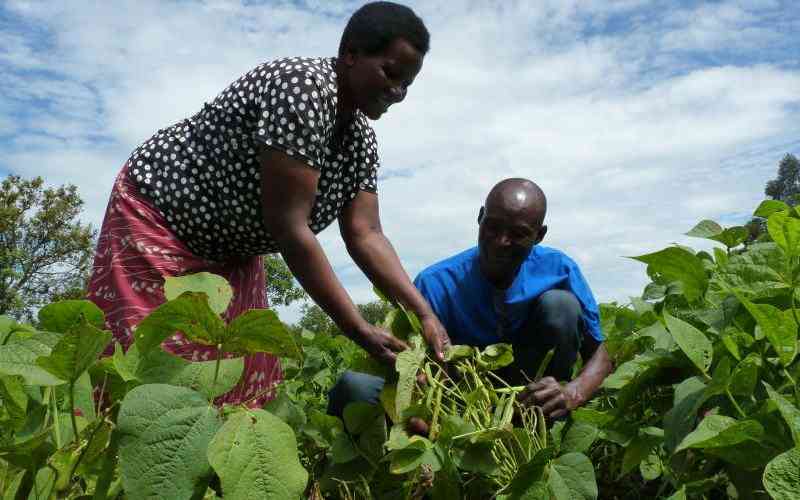
Gilbert Ombok and his wife Grace Ombok at their beans farm at Kababu Village in Suna West sub-county Migori county. [Caleb Kingwara, Standard]
Gilbert Ombok, 56, ditched tobacco farming and embraced high iron-rich beans commonly known as Nyota beans when the adverse effect of the nicotine crops caught up with him.
His involvement in tobacco farming has made him feel the effects of the chemicals he used in farming and curing tobacco to date.
The father of four who lives in Nyamome area in Suna West Sub-County says he usually experienced coughs which at some point left him with chest pains.
"Whenever I would visit a health facility, I would be diagnosed with a chest infection. The infections were too much," Mr Ombok says.
He cannot work in a dusty place and claims the chemicals caused him an allergy.
Ombok who grew tobacco as a cash crop for three years was advised to stop using heavy chemicals when he last visited Migori County Referral Hospital in early 2021.
He admits that the use of heavy chemicals was hazardous to their lives.
"The work was quite tedious as it takes almost three months from the seedbed before it is transplanted. It involves intensive labour which is very costly. We could get very little results," Ombok says.
Moreover, when there was a call for a Christian job after being converted, Ombok didn't find tobacco farming appropriate.
He started iron bean farming two years ago when it was first introduced by the World Food Program (WFP) organization.
Being a member of (FtMA) Farm to Market Alliance and (CGA) Cereals Growers Association, Ombok was part of hundreds of farmers supported by the program.
"The Nyota beans are quite profitable and advantageous," Ombok explains.
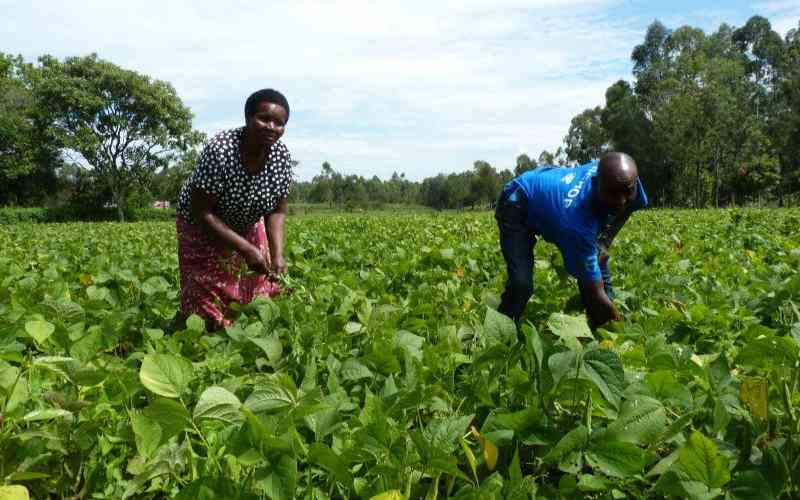
Gilbert Ombok and his wife Grace Ombok. [Caleb Kingwara, Standard]
In his view, tobacco has very beautiful leaves but cannot be eaten.
He says the Nyota beans only take three months to mature compared to tobacco which takes longer on the farm.
A tin of Nyota beans goes for Sh300.
The iron beans have a ready market as they are bought by the WFP program, aside from the local market.
Ombok admits of reaping big from his first harvest which yielded him Sh60, 000 from the six bags he harvested.
He says tobacco promotes child labour, as farmers prefer cheap labour.
Another farmer Elizabeth Atieno, 45, also ditched tobacco farming and embraced iron bean farming in 2021.
She says she had reaped a lot of benefits since she decided to choose the alternative crop.
"It is like we were blinded by the crop. It is not as profitable as Nyota beans are," Ms Atieno, a farmer from Bondo Nyironge village in Suna West says.
She explains that the crop requires a lot of attention and inputs which were costly.
The mother of five who had engaged in tobacco farming for close to seven years had dedicated her three-acre farm to tobacco farming, which caused her and her family food insecurity and malnutrition.
The planting, weeding and curing of tobacco was so involving that she involved all her family members which resulted in disruption of learning for her children.
She explains that she often had chest pains and when she went for an X-ray, her lungs were found to have been affected by the smoke from tobacco curing.
"I was not healthy. This forced me to shift focus from tobacco growing to the Nyota beans we were introduced to," Atieno narrates.
So far, a total of 406 acres of tobacco farms in the county are now under alternative crops.
The Tobacco Free Farms Project was started in 2021 with 330 farmers, covering 370 acres across four wards which include Kanyamkago in Uriri Sub-County, Masaba in Kuria West Sub-County, Wiga Ward in Suna West Sub-Couunty and Kakrao Ward in Suna East Sub-County.
The success of the project has encouraged more tobacco farmers in the county to turn to iron bean (Nyota bean) farming.
Currently, more than 1070 farmers have engaged in iron beans farming.
Iron beans have now become a darling to tobacco growers due to their benefits which include faster maturity, drought resistance and being that they are rich in iron.
Migori County crop officer James Masisa says Nyota beans are a fast-maturity variety that can be grown in semi-arid areas like Nyatike.
According to the crop officer, the beans are highly nutritious especially for lactating mothers as it is rich in iron and zinc.
He explains that to grow Nyota beans, one needs to use 20 to 25 kilos per acre, plant at a depth of between four to five centimeter and a spacing of 50 by 10 centimeter or 45 by 15 centimeter.
Before planting, the field ought to be well prepared aside from having soil analysis done for fertilizer requirements.
The crop should be weeded at least one to two times per season.
"The first weeding should be done two weeks after emergence and the second one before flowering," Mr. Masisa explains.
He says common diseases that affect beans like root rots, rust disease, bacterial blight and yellow mosaic virus among others.
Masise advises farmers to plant only virus-free seeds; plant resistant varieties, follow crop rotation with non-host crops, plant disease-free seeds or treat affected seeds with an antibiotic to reduce levels of bacterium and plant-certified seeds.
In 2021, WFP bought 134 tons of beans from Migori farmers who were formerly engaged in Tobacco farming.
The farmers received Sh13 million from the sale.
It has been working towards giving tobacco farmers an alternative solution to unhealthy tobacco farming.
Aside from having health effects, tobacco is known to be an environmental hazard that needs eradication.
Regional Director for Farm to Market Alliance Mr. Simeon Cammelbeeck says they have already set up 48 farmer service centers in the county to bring services closer to residents.
The Tobacco Control Board Chair Nancy Kachoka noted that tobacco growing areas usually experience socio-economic issues like gender-based violence, poverty, child labor and non-communicable diseases.
"Tobacco is a public health disaster that needs to be addressed," she says, adding that tobacco-related illnesses like asthma and cancer are on the rise.
She says that tobacco products are known to contain 7, 000 chemicals which include cancer causing agents, irritants and poison among others.
The country had introduced a Tobacco Control Act to make it a Tobacco-free nation.
According to WHO reports, more than 6, 000 Kenyans die of tobacco-related diseases every year.
Farmers have now expressed their joy of moving out from tobacco farming.
Migori Deputy Governor Joseph Mahiri notes that the county will continue to tighten set rules and regulations to ensure it becomes a tobacco-free society.
"Residents of this county ought to consider shifting to other alternative crops in order to avoid tobacco-related diseases and get good returns," Dr. Mahiri says, adding that they see beans as a viable option to the farmers.
The county plans on coming up with a bill that will see that tobacco is done away with.
It has currently factored in Sh3 million for the purchase of seeds for farmers.
"So far, over 1000 farmers have dumped tobacco farming and are now planting Nyota beans. WFP are purchasing the produce at market price," the deputy governor says.
Migori County has become a bench-marking county for tobacco-growing regions like Busia and Bungoma counties and Zambia.
 The Standard Group Plc is a multi-media organization with investments in media platforms spanning newspaper print
operations, television, radio broadcasting, digital and online services. The Standard Group is recognized as a
leading multi-media house in Kenya with a key influence in matters of national and international interest.
The Standard Group Plc is a multi-media organization with investments in media platforms spanning newspaper print
operations, television, radio broadcasting, digital and online services. The Standard Group is recognized as a
leading multi-media house in Kenya with a key influence in matters of national and international interest.

